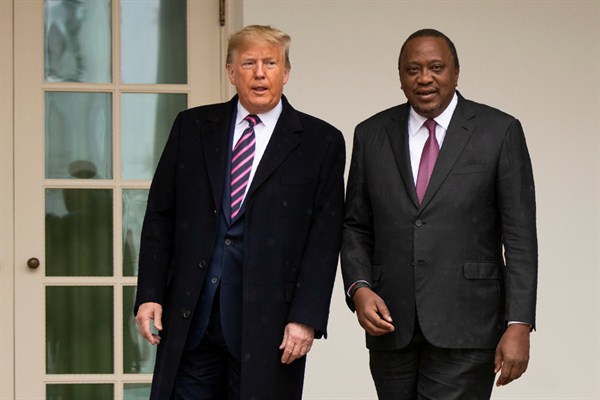Across Africa and beyond it, there is widespread agreement among governments and policymakers that economic integration would give a critical boost to growth and development on the continent. Yet when he visited Washington earlier this month, Kenya’s president, Uhuru Kenyatta, pledged alongside President Donald Trump to launch negotiations toward a bilateral trade deal. The two leaders’ motivations are likely quite different, and the odds of a successful negotiation are uncertain at best. But, like the European Union’s own ad hoc trade deals throughout Africa, a U.S.-Kenya free trade pact would create new barriers to intra-African trade, rather than reducing them, thus undercutting the regional integration efforts that are so important for Africa’s future economic growth.
Last summer, the African Continental Free Trade Agreement, or AfCFTA, came into force after 54 of the 55 countries in Africa signed it and 22 of them ratified it. Six more countries have since submitted their instruments of ratification, bringing the total to more than half of the deal’s signatories. At the moment, the AfCFTA is admittedly more a vision than reality, and it will take many years to make the transition from one to the other. But most African nations are embracing the initiative because they recognize the need to break down the intra-regional barriers that keep their economies small and uncompetitive. According to World Bank data for Africa and U.S. Bureau of Economic Analysis figures for American metropolitan areas, Nigeria’s economy, Africa’s largest, is comparable to that of the metropolitan area of Atlanta, Georgia. All of Sub-Saharan Africa has an economy comparable to that of New York City and its environs.
Many countries have responded by developing their own regional economic communities in eastern, southern, central and western Africa. The East African Community, of which Kenya is a member, is one of the most developed, though even it has yet to achieve a fully integrated, barrier-free economy among its members. During his visit to the White House, Kenyatta asserted that negotiating bilaterally with the U.S. is not incompatible with his country’s broader regional and continental ambitions.

